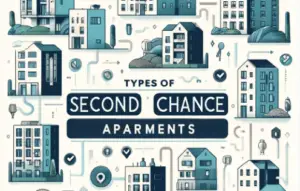
Second Chance Apartments
Are you struggling to secure an apartment because of poor credit or previous evictions? These are second chance apartments; your lifeline from where you want to be back in an apartment. This guide covers nearly everything you need to navigate housing and re-establish your life
This guide will help you find second chance apartments no matter if you lost a job, have gone through bankruptcy, or have a criminal record or other issues
Best Strategy to Find Second Chance Apartments
1. Assess Your Situation and Understand Your Options
Start your journey by identifying any issues in your rental or credit history that may impact your application, such as past evictions or low credit. Use tools like Credit Karma for free credit reports and RentPrep for tenant screening insights and tips
2. Research Local Second Chance Rental Programs
Explore City and State-Specific Programs – Many cities offer assistance programs tailored for second chance renters. Check local government websites for information or explore Affordable Housing Online to find programs by state.
Consider Non-Profit Assistance – Reach out to non-profits like The Salvation Army and Catholic Charities for housing assistance and potential second chance rental leads.
Use Apartment Locator Services for Expert Help
Many locator services are experienced in finding second chance rentals and can connect you with landlords who offer flexible lease terms. Check services like Apartment Finder and local city-specific locators to maximize your options.
Consult Experienced Real Estate Agents – Some real estate agents specialize in second chance rentals. Use directories like Realtor.com’s Agent Finder to connect with agents who understand the second chance leasing.
5. Directly Contact Property Management Companies
Contact companies with multiple properties in your area, as some may have flexible policies for second chance renters. Use PropertyManagement.com to locate reputable property management firms in your location.
Request Recommendations or Referrals – Ask property managers if they can recommend landlords or properties that cater to second chance renters. Some property managers can provide direct guidance on available options.
6. Network Through Social Media and Online Communities
Join Local Housing and Rental Groups on Facebook – Many cities have rental groups specifically for people with unique rental needs. Search groups like “Housing for People with Bad Credit” and other area-specific groups for leads.
Participate in Online Rental Forums and Reddit Communities – Reddit subreddits like r/RealEstate and r/rentals provide valuable information and advice from tenants and landlords. Engage with these communities for advice and potential leads.
7. Use Online Search apps and websites to find Second Chance Apartments
# Online platform and apps are mention below

Top Platforms for Finding Second Chance Apartments
Platforms that help renters who have had problems with rentals in the past can make it much easier to find Second Chance Apartments. These top sites and apps put you in touch with apartments that are open to second chances.
They give you choices like flexible leases, private landlords, and government-assisted housing. No matter what your rental history is like, these tools can help you find a place that fits your wants.. Here are some best Platforms :
1. Second Chance Apartments
Why It’s Great: This site is fully dedicated to second chance rentals, helping renters find properties that openly welcome applicants with credit or rental history challenges.
How It Helps: With listings focused on Second Chance Apartments in major U.S. cities, it simplifies the search for renters needing flexibility. Visit: Second Chance Apartments
2. My Second Chance Rentals
Why It’s Great: Designed specifically for renters with past issues, My Second Chance Rentals provides listings and resources to make finding Second Chance Apartments easier.
How It Helps: Tailored listings and supportive guidance ensure that renters can quickly locate second chance-friendly properties. Visit: My Second Chance Rentals
3. Apartment Finder
Why It’s Great: Apartment Finder’s broad selection includes private landlords who may be more open to offering Second Chance Apartments for renters facing credit or rental history issues.
How It Helps: With options to filter for flexible leases, Apartment Finder is a great resource for second chance renters. Visit: Apartment Finder
4. Craigslist
Why It’s Great: Craigslist’s local listings include a variety of private landlords, many of whom may consider offering Second Chance Apartments with flexible terms.
How It Helps: Direct communication with landlords can increase the chances of negotiating a second chance lease. Visit: Craigslist
5. PadMapper
Why It’s Great: PadMapper aggregates listings from several sources, including Craigslist, which is helpful for locating smaller landlords who may offer Second Chance Apartments.
How It Helps: PadMapper’s filtering options make it easy to find properties that meet second chance rental needs. Visit: PadMapper
6. Zillow Rentals
Why It’s Great: Zillow’s large platform includes listings from private landlords, increasing the possibility of finding Second Chance Apartments in a preferred area.
How It Helps: By using keywords like “flexible lease,” second chance renters can target properties that are more likely to accept applications with past challenges. Visit: Zillow Rentals
7. Realtor.com Rentals
Why It’s Great: Realtor.com offers a wide selection of rentals, including smaller properties that are often open to second chance leasing.
How It Helps: This platform’s detailed listings make it easier for renters to find Second Chance Apartments and connect with understanding landlords. Visit: Realtor.com Rentals
8. Rent.com
Why It’s Great: Rent.com provides a broad selection of rental options from various landlords, including those that may be open to second chance leasing.
How It Helps: With user-friendly filters, Rent.com helps renters locate Second Chance Apartments that match their leasing needs. Visit: Rent.com
9. Apartment List
Why It’s Great: Apartment List matches renters with listings that fit their specific needs, including options for flexible lease terms suited for Second Chance Apartments.
How It Helps: The personalized matching system makes it easier to connect with properties that are more accommodating to second chance renters. Visit: Apartment List
Top Mobile Apps for Finding Second Chance Apartments
It can be hard to find Second Chance Apartments, but mobile apps make it easier and more available. These top apps help renters find second chance friendly apartments by offering features like flexible lease choices, private landlord listings, and information about the neighborhood.
They can help you find the right place even if you have had problems with rentals in the past. Few best apps are below:
1. Zillow Rentals
Why It’s Great: Zillow offers a huge variety of rental listings, including those from private landlords who may be more open to flexible leasing for second chance renters.
How It Helps: With advanced filters and customizable searches, Zillow lets you look for rentals by location, budget, and keywords like “flexible lease.” Download: Zillow Rentals for Android
2. Apartments.com
Why It’s Great: Apartments.com has a robust selection of listings and detailed reviews, which can help renters with past issues find suitable housing.
How It Helps: Search with filters for flexible lease options and get insights on neighborhood amenities and reviews. Download: Apartments.com for Android
3. PadMapper
Why It’s Great: PadMapper gathers listings from multiple sources, like Craigslist, and offers many private landlord options that might allow for flexible terms.
How It Helps: Use search filters like price and pet-friendliness to find listings that may suit second chance renters. Download: PadMapper for Android
4. Rent.com
Why It’s Great: Rent.com includes a range of rental options managed by both large and small property owners, increasing the chance of finding flexible leasing terms.
How It Helps: The app’s filtering options make it easy to narrow down rentals with second chance-friendly policies. Download: Rent.com for Android
5. Trulia Rentals
Why It’s Great: Trulia provides detailed information on neighborhoods, which helps renters find not only housing but also the best areas for flexible leasing options.
How It Helps: Trulia’s neighborhood insights are beneficial for second chance renters looking for suitable locations and flexible landlords. Download: Trulia Rentals for Android
6. Realtor.com Rentals
Why It’s Great: Realtor.com offers a wide variety of rental listings, including smaller properties that may be more lenient with rental history issues.
How It Helps: This app allows you to explore detailed local listings and find properties with potential flexibility for second chance renters. Download: Realtor.com Rentals for Android

Top Benefits of Second Chance Apartments
Second chance apartments provide great opportunities for individuals who have faced difficulties in securing housing. These apartments offer many benefits, making them a valuable option for people looking to rebuild their rental history and regain financial stability.
Financial Relief and Flexibility
For renters who have struggled with past financial issues, second chance apartments offer flexible payment options and lower upfront costs compared to some traditional apartments.
Many second chance landlords are willing to accept alternative payment arrangements, such as installments for security deposits or prepaid rent, providing a manageable way for tenants to secure housing without immediate financial strain.
Opportunity to Rebuild Credit and Rental History
One of the main advantages of second chance apartments is the chance to rebuild your credit score and establish a positive rental history.
By paying rent consistently and following the terms of your lease, tenants can improve their rental reputation, making it easier to qualify for traditional apartments or even homeownership in the future.
Stability for Families, Students, and Individuals
People, couples, and students who are having trouble finding a place to live can find stability at second chance apartments. People can stay connected to jobs, schools, and health care services better if they have a permanent home. This can be hard to do if you move around a lot or live in temporary housing.
Requirements & Qualifying for Second Chance Apartments
Qualifying for second chance apartments requires understanding the unique requirements and qualifications landlords may have and preparing the right documentation. Here are the roadmap :
Understanding Credit Score Requirements
Many second chance apartments have lower credit score requirements than traditional rentals, but it’s still important to demonstrate financial responsibility. Here’s how you can qualify, even with a low credit score:
✨Check Your Credit Report: Start by checking your credit score to understand where you stand. Use free resources like AnnualCreditReport.com to access your report from all major bureaus once a year.
✨Highlight Positive Financial Patterns: If you’ve been making regular payments on loans, utilities, or other financial obligations, showcase these to demonstrate reliability. Landlords are often more willing to overlook credit issues if they see positive trends.
✨Consider Co-Signers: A co-signer with a higher credit score can help strengthen your application by guaranteeing the lease. Some second chance apartments allow this option to offset credit risks.
External resource: Credit Karma offers tools to monitor and understand your credit score.
Rental History
Renting an apartment can be a challenging process, especially if your rental history includes past evictions, late payments, or other issues. However, second chance apartments come with specific rental history requirements that aim to balance tenant opportunity with landlord security.
Flexible Qualification Options
Second chance apartments offer flexible qualification options to help people with past rental problems.
They may accept co-signers, review bank statements instead of strict credit checks, or focus on recent improvements. These options make it easier for tenants with evictions or bad credit to find a fresh start.
Background Checks
Rental history, credit, and evictions overall background can be check at second chance apartments. Show better financial stability, explain past issues honestly, and resolve debts to overcome challenges. Positive landlord references and regular income might reassure landlords despite a bad renting history.
Navigating Rental History and Past Evictions
Past evictions can pose a challenge, but second chance apartments are typically more understanding if you provide context. Here’s how to navigate rental history issues effectively:
✨Prepare an Explanation: Be ready to explain the circumstances behind any evictions. Whether due to financial hardship, job loss, or other reasons, transparency can work in your favor.
If you’ve since secured stable employment or resolved financial issues, gather documents to demonstrate these improvements. This could include pay stubs, bank statements, or letters from recent landlords.
Bankruptcy and Its Impact on Rental Applications
✨Present Recent Financial Stability: Show evidence of financial improvement since your bankruptcy, such as steady income, savings, or a current debt repayment plan. These indicate a commitment to financial responsibility.
Explain to landlords that the bankruptcy allowed you to clear debts and start fresh, which can reassure them that you’re less of a financial risk now.
Verifying Employment and Income
Stable income is a critical factor for landlords when assessing applications. Here’s how to strengthen this part of your application:
✨Gather Recent Pay Stubs or Bank Statements: Proof of income shows that you’re financially capable of paying rent. Prepare to provide pay stubs, direct deposit records, or bank statements to verify your income.
✨Use Future Income Proof if Recently Employed: If you’ve just started a new job, provide an offer letter or contract as verification. Many landlords accept this as proof of future income stability.
External resource: Glassdoor has resources for understanding employment verification and negotiating offers if you’re securing a new job. Or learn more about Income Requirements
Application Process for Second Chance Apartments
Applying for second chance apartments involves a few additional steps to prove reliability and commitment. You can also read our Application process for more detail. Here’s what to expect:
✨Prepare a Rental History Resume: Create a summary of your rental history that highlights any positive aspects, such as timely payments or long-term leases. This can make a strong impression.
✨Request Reference Letters: References from previous landlords, employers, or community members can add weight to your application. Choose references who can vouch for your reliability and commitment.
Gather Key Documents for Your Application
Why It Matters:
Submitting a complete, organized application package with all necessary documents shows landlords that you’re a serious and reliable applicant.
Documents to Include:
✨Proof of Income: This could include recent pay stubs, tax returns, bank statements, or a letter from your employer. Most landlords want to see that your monthly income is at least 2.5 to 3 times the rent amount.
✨Employment Verification: A letter from your employer stating your position, salary, and length of employment helps verify your stability. If self-employed, provide recent tax returns or bank statements showing consistent income.
✨Rental References: Contact previous landlords or property managers to write a reference letter attesting to your reliability, timely rent payments, and respectful behavior as a tenant.
✨Personal Statement: Write a brief, honest explanation of any past issues (like evictions or credit problems), how you’ve improved since, and why you’re a reliable tenant now.
Preparing a Successful Application

When applying for second chance apartments, it is important to send in a full and convincing application. Here are some things you can do to make your application stronger and raise your chances of getting approved.
Write an Effective Cover Letter
A cover letter can be a great way to explain your situation and establish rapport with a landlord. Here’s how to make it impactful:
✨Be Honest but Positive: Address any rental challenges briefly, but focus more on the steps you’ve taken to improve. This could include efforts to stabilize your income, pay off debt, or rehabilitate after legal issues.
✨Express Interest in the Community: Mention why you’re interested in the specific property or neighborhood, showing that you’re invested in a positive living experience.
Here is a cover letter sample. You can get an idea from this or if you like just copy it and use:
Second chance Rental Application Cover Letter Template
[Your Name]
[Your Address]
[City, State, ZIP Code]
[Your Email Address]
[Your Phone Number]
[Date]
[Landlord’s or Property Manager’s Name]
[Apartment Name or Address]
[City, State, ZIP Code]
Subject: Rental Application for [Apartment Name/Unit]
Dear [Landlord’s or Property Manager’s Name],
I hope this message finds you well. My name is [Your Name], and I am writing to express my sincere interest in renting [specific apartment or unit, e.g., “Unit 2B”] at [Apartment Name]. I deeply value the opportunity to apply for a second chance apartment, as I am eager to rebuild and establish a solid rental history.
In the past, I faced challenges such as [briefly explain issue, e.g., “a prior eviction during a period of financial hardship” or “credit issues caused by unexpected medical expenses”]. Since then, I have worked diligently to turn my situation around. Specifically, I have [list improvements, e.g., “paid off outstanding balances, improved my credit score by X points, and maintained stable employment”]. These experiences have taught me the importance of financial planning and timely rent payments, and I am committed to being a dependable tenant moving forward.
Currently, I am employed as [Your Job Title] at [Company Name], where I earn [monthly/annual income]. My income is steady, and I have budgeted carefully to ensure my ability to meet all rental obligations on time. In addition, I have established an emergency savings fund to provide added security for my financial responsibilities.
To support my application, I have included the following:
- Proof of income, including recent pay stubs and/or bank statements.
- Positive references from past landlords or employers attesting to my character and responsibility.
- A recent credit report showing consistent improvement.
I am confident that I can meet your rental requirements and contribute positively to the community at [Apartment Name]. I am happy to discuss my application in further detail, provide additional documentation, or answer any questions you may have. I would also welcome the opportunity for a meeting to personally assure you of my commitment to being a reliable and respectful tenant.
Thank you for considering my application. I greatly appreciate your time and understanding. I look forward to the possibility of renting [Apartment Name/Unit] and making it my home.
Sincerely,
[Your Full Name]
[Your Contact Information]
What Landlords Look for in Second Chance Apartment Applications
Landlords look for indications of stability, responsibility, and commitment. Here’s what to keep in mind as you prepare your application:
Proof of Financial Responsibility: Show regular income or a history of consistent payments, even if they’re for smaller debts or utilities.
Commitment to Stability: Explain your reasons for choosing the apartment and demonstrate a genuine interest in maintaining a long-term lease.
Improving Your Chances of Approval

Enhancing your application in small ways can make a difference. Here are a few strategies to improve your chances:



Offering Higher Security Deposits or Prepaid Rent
If your rental history or credit is less than ideal, offering a larger security deposit or several months of prepaid rent can reassure landlords:


Using Social Proof to Your Advantage When Applying
Social proof, such as positive references or reviews from previous landlords, can enhance your application’s credibility.
Landlord References: If you’ve rented successfully in the past, ask your landlord to provide a letter highlighting your positive qualities.
Employer Recommendations: A letter from your employer vouching for your stability and responsibility can add strength to your application, especially if they confirm steady income
Prepare for a Second Chance Apartment Interview
If the landlord or property manager requires an interview, this is your chance to make a positive impression. Here’s how to prepare:
✨Be Transparent but Positive: Acknowledge any past issues briefly, then pivot to the positive steps you’ve taken to improve your situation. This demonstrates accountability and a proactive attitude.
✨Practice Common Questions: Prepare for common questions about your rental history, employment status, and financial stability. Practicing these answers helps you stay calm and composed during the interview.
✨Dress Professionally: Dress in a way that shows respect for the interview process. Even if it’s a casual meeting, presenting yourself well can make a good impression.
Dealing with Rejection from Second Chance Apartments
Rejections can be discouraging, but they’re also a chance to learn and improve. Here’s how to handle a denial from a second chance apartment:
✨Ask for Feedback: Politely ask the landlord why your application was denied. Understanding their reasons can help you strengthen future applications.
✨Evaluate and Improve: Consider the feedback and take steps to address any weaknesses, such as improving your credit score, securing additional income, or finding a co-signer.
Next Steps After a Denied Application
If you receive a denial, don’t be discouraged. There are still steps you can take to find housing:
Explore Alternative Options: Look into other types of housing, such as private rentals, co-living arrangements, or subletting, to expand your options.
Reapply After Addressing Issues: Some landlords are willing to reconsider applicants after they’ve addressed key issues. If you’ve improved your credit or secured a stable job, reach out to the landlord again to express your renewed interest.
Appeal a Denied Application for Second Chance Apartments
Sometimes you can appeal a denied application if you think it was unfair or if you’ve improved your situation.If it happen then you can :
✨Submit Additional Documentation: Provide any new documents that demonstrate stability, such as updated pay stubs, credit reports, or landlord references.
✨Request a Second Interview: If possible, ask the landlord for a follow-up meeting to discuss the improvements you’ve made and reaffirm your commitment to a responsible tenancy.
External resource: Read this What to Do If Your Rental Application Is Denied
Handle Multiple Rental Applications When Searching for Second Chance Apartments
Submitting multiple applications can be a practical approach, but it requires careful organization. Here’s how to manage multiple applications effectively:
✨Track Each Application: Use a spreadsheet to record the status, deadlines, and required documents for each application. This will prevent missed deadlines and overlapping appointments.
Once you secure an apartment, politely notify other landlords that you’re no longer in need. This shows respect and keeps your options open for the future.
Improve Rental Ability

To secure a second chance apartment, you need to enhance your rental ability. This includes proving stable income, obtaining positive landlord references, and resolving past issues.you can learn more about Improve Rental Ability in our guide.
Overcoming Rental Issues
Facing rental challenges like evictions, bad credit, or a lack of rental history? Second chance apartments provide solutions. Discover how to tackle these hurdles by reading our guide on Overcoming Rental Issues to improve your chances.
Handling Broken Lease Agreements
A broken lease can complicate renting, but it doesn’t have to stop you. Learn how to manage unpaid balances, disputes, and more to improve your rental history. Visit our detailed page on Handling Broken Lease Agreements for helpful strategies.
Addressing Past Evictions
Evictions can be a barrier for renting second chance apartments, but they don’t define your future. Discover ways to explain past evictions, resolve issues, and show landlords your improvements. Check out our tips on Addressing Past Evictions to start fresh.
Building a Positive Tenant Profile
A strong tenant profile makes all the difference. Learn how to create one with consistent payments, good references, and financial stability. Find out more about Building a Positive Tenant Profile and increasing your approval chances.
Criminal Record Assistance
A criminal record can make renting difficult, but second chance apartments may offer opportunities. Learn how to navigate the process with transparency and preparation. Read our guide on Criminal Record Assistance to overcome this challenge.
Clearing Rental History Issues
Clearing past rental history issues is essential for renting second chance apartments. Find out how to resolve debts, correct errors, and rebuild your rental profile. Visit our guide on Clearing Rental History Issues for detailed steps.
Credit Repair Tips
Poor credit can limit rental options, but there are ways to improve. Discover practical credit repair strategies, from reducing debts to fixing errors. Check out our expert advice on Credit Repair Tips to boost your credit worthiness.
Handle Rent Increases in Second Chance Apartments
If you’re notified of a rent increase in your second chance apartment, there are ways to manage this situation and potentially negotiate the terms.
✨Negotiate for a Lower Increase: Politely discuss the increase with the landlord and express your desire to stay in the apartment. If you’ve been a reliable tenant, they may be willing to offer a smaller increase.
✨Offer to Sign a Longer Lease: Some landlords are open to reducing the rent increase if you commit to a longer lease. This guarantees them stability and may help you maintain a manageable rent.
Negotiate Rent Discounts in Second Chance Apartments
Propose Small Repairs or Maintenance: If you have handyman or any other skills, offer to take on small maintenance tasks in exchange for a rent reduction. Some landlords appreciate the help and may be willing to reduce your rent.
If possible, offer a higher security deposit or prepay a portion of the rent. This can improve your bargaining power and give the landlord confidence in your commitment.
Special Considerations for Different Groups
Nothing against friends, but a lot of people are going to struggle with second chance apartments much more than others in different demographics and we cover off on some of the higher level tenants in need below :

Finding Second Chance Apartments After Job Loss or Employment Gaps
Experiencing a job loss or employment gap can make it harder to qualify for rentals. Here are some tips for finding these apartments after a job loss:
Use Offer Letters or Proof of New Employment: If you’ve recently secured a job, many second chance landlords will consider an offer letter as proof of income. This helps show landlords that you’re on the path to financial stability.
Consider Alternative Income Sources: If you have other income sources like unemployment benefits, freelance work, or side gigs, include these in your application. Second chance landlords may be more open to accepting these alternatives.
Reach Out to Community Resources: Local housing organizations can help renters find second chance housing after job loss. Consider contacting Salvation Army Housing Assistance, Catholic Charities, or United Way for guidance.
External resource: CareerOneStop is a government resource offering support for job seekers and people affected by employment gaps.
Second Chance Apartments Near Public Assistance Offices
For some renters, proximity to public assistance offices is crucial for accessing resources like financial support or healthcare. Here’s how to locate second chance apartments close to these offices:
Use Mapping Tools to Find Convenient Locations: Google Maps and MapQuest can help you locate public assistance offices. Search for nearby apartments and look for properties labeled as second chance rentals.
Inquire About Local Housing Programs: Public assistance offices may offer or refer renters to second chance housing programs. Ask about specific second chance apartment options in your area.
External resource: National Council of State Housing Agencies can help you locate state-specific housing programs that assist renters with financial difficulties.
Second Chance Apartments in Competitive Rental Markets
Here are some tips for finding housing in competitive rental markets:
✨Broaden Your Search Area: Expanding your search to nearby cities or suburbs can give you more options and less competitive environments.
✨Connect with Local Real Estate Agents: Real estate agents often know of rental properties that aren’t widely advertised. Contact agents specializing in rentals for information about second chance apartments. Realtor.com is a well-known real estate site where you can connect with local agents for rental support.
✨Network Within Community Groups: Join local groups on social media, such as Facebook groups or Nextdoor. Landlords often post vacancies in these groups, and members may know of available rentals.Facebook Marketplace offers local housing listings, where you can directly connect with landlords.
Find Roommate Opportunities in Second Chance Apartments
A roommate can increase your chances of qualifying for a second chance apartment by sharing rental responsibilities. Here’s how to find a compatible roommate:
✨Use Roommate Matching Services: Platforms like Roomi, Spareroom and Roommates.com connect people looking to share housing costs. These sites help you find roommates based on preferences like budget, rental history, and lifestyle.
Stay Organized During Search for Second Chance Apartments
Staying organized can streamline your search and boost your chances of securing housing.
✨Create a Dedicated Folder for Documents: Use a physical or digital folder to store your documents, like proof of income, identification, and references. Organizing these ahead of time will make it easier to submit complete applications. Dropbox or Google Drive can securely store your documents online for easy access.
✨Use a Spreadsheet to Track Applications: Document each apartment, including the landlord’s contact info, application deadlines, and special requirements. Tools like Google Sheets and Trello can help you monitor applications and manage your progress.
✨Set Reminders for Follow-Ups: Following up after submitting applications can demonstrate your commitment. Use your calendar or a reminder app to keep track of deadlines and follow-up times.Resource: Todoist and Microsoft To Do are great apps for setting reminders and staying organized.
Financial Planning for Second Chance Apartments
Proper financial planning is essential for maintaining a stable rental situation, especially for those renting second chance apartments. Here’s how to plan and manage your finances effectively to ensure long-term stability.
Setting a Realistic Budget for Rent
Creating a budget is the first step in managing rent payments consistently. Here’s how to set a realistic budget:
✨Calculate Total Monthly Expenses: Include all monthly expenses, such as utilities, transportation, groceries, and debt payments. Deduct these from your monthly income to determine what you can comfortably afford in rent.
✨Aim for 30% of Income on Rent: Ideally, rent should make up no more than 30% of your monthly income. If this isn’t feasible, aim to adjust other expenses or seek additional sources of income to support a stable budget.
External resource: NerdWallet’s Budget Calculator can help you create a monthly budget that aligns with your income and expenses.
Security Deposit and Move In Fees
Second chance apartments may require higher security deposits or additional fees upfront.If the security deposit is higher than expected, start saving as soon as possible. Aim to set aside a small amount each month leading up to your move.
Overcoming Common Issues
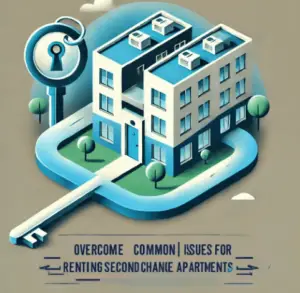
Securing a rental with past challenges can be tough, but second chance apartments offer solutions. Learn how to overcome issues like Evictions, Broken Leases, Bad Credit, Low Income, and Criminal Records with practical tips and strategies. For more detail about this read our Rental Difficulty & Tips
Evictions
Past evictions can make renting harder. Rebuild trust by resolving unpaid balances and demonstrating recent financial responsibility. Explore more about handling Evictions and improving your chances of approval.
Broken Leases
A broken lease may raise concerns for landlords. Address this by settling debts, gathering positive references, and showing a stable rental history. Learn actionable strategies for Broken Leases to strengthen your application.
Bad Credit
Bad credit can affect your rental application, but second chance apartments may focus on recent improvements. Use tools like budgeting and credit repair services. Visit Bad Credit to find out how to boost your approval chances.
Low Income
Low income doesn’t have to be a barrier. Look for income-based housing, apply for rental assistance, or use a co-signer. Learn more about overcoming Low Income challenges in your rental journey.
Criminal Records
A criminal record can complicate renting, but honesty and improvement can help. Highlight stable income, good references, and positive changes. Visit our guide on Criminal Records for expert advice on securing housing.
Best Cities for Finding Second Chance Apartments

In some U.S. towns, the rental market is known for being more open, which makes it easier to find second chance apartments that have been used before. There are often landlords in these cities who are ready to work with renters who have had credit or rental problems in the past.
Cities with the Most Second Chance Apartments
Some cities have a larger selection of second chance apartments, often due to a higher volume of rentals and a more flexible rental market.
✔Dallas, Texas: Dallas is known for its abundance of second chance apartments and landlords open to renters with previous challenges. The city’s growing rental market makes it a strong option for second chance housing.
✔Atlanta, Georgia: Atlanta has a significant rental market with a range of housing options for second chance renters. Many landlords are open to working with renters who have credit issues, especially in the city’s suburban areas.
✔Phoenix, Arizona: With Phoenix’s rapid population growth, there’s an increasing demand for rentals, and some landlords are willing to offer flexibility to renters with challenging histories.
2. Urban vs. Suburban Areas: Where to Look
When searching for second chance apartments, consider the differences between urban and suburban areas:
✔Urban Areas: Cities often have a wider variety of rental options, making it easier to find landlords who specialize in second chance rentals. However, urban rentals may come with higher rent and stricter competition.
✔Suburban Areas: Suburban areas tend to have more flexible landlords and affordable rent, making them a viable option for second chance renters. Many suburban communities offer similar amenities as urban areas without the high cost of city living.
Avoiding Scams When Searching for Second Chance Apartments
Finding second chance apartments can be hard, and sadly, scammers often target renters who have had problems with money or their rental history. Here are important steps you can take to avoid renting scams and find a real apartment:
Tips for Spotting Scams
Rental scams often involve fake listings, false promises, or unexpected fees. Here’s how to identify and avoid these scams:
✨Verify the Listing’s Legitimacy: Always cross-check rental listings by visiting trusted sites like Apartments.com or Zillow. Avoid listings found only on social media or free classifieds sites, which are more susceptible to scams.
✨Never Pay Upfront for a Viewing: Scammers may ask for fees upfront, such as deposits or viewing fees, without showing the property. Legitimate landlords won’t request payment before a signed lease. If you’re asked for money before a viewing, it’s likely a scam.
✨Watch for High-Pressure Tactics: Scammers often try to rush renters into making payments or signing agreements quickly. Be wary of anyone pressuring you to pay immediately or bypass normal procedures.
Building Trust with Your Landlord
It can be advantageous to build a positive relationship with your landlord, particularly if you are a second chance apartment seeker. Here’s how to build trust from the start:
✨Communicate Openly and Honestly: If you have rental history issues, address them directly. Being transparent about your situation and sharing the steps you’ve taken to improve builds credibility and shows you’re a responsible tenant.
✨Show Consistent Financial Responsibility: Offer to set up automatic rent payments or provide proof of income stability, such as recent pay stubs or bank statements. Landlords appreciate proactive tenants who demonstrate commitment to timely payments
Resources like RentPrep provide tips on tenant-landlord relationships and advice on how to establish a positive rental history.
Types of Second Chance Apartments
When searching for second chance apartments, it’s important to understand the different types available. These apartments are typically managed by either private landlords or larger corporate property managers, and they may also include government-assisted housing.
Studio Apartments
Studio apartments are compact spaces perfect for singles or minimalists. They combine living, sleeping, and kitchen areas in one room. Discover whether a Studio Apartment is the right choice for your needs.
One Bedroom
A one-bedroom apartment offers a separate bedroom for added privacy, ideal for couples or individuals wanting extra space. Learn more about the benefits of choosing a One Bedroom Apartment.
Two Bedroom
Two-bedroom apartments are great for families, roommates, or those needing a home office. Explore more about Two Bedroom Apartment might be the perfect option for you.
Loft
Lofts offer open, spacious layouts with high ceilings, often in urban settings. They’re stylish and versatile, suitable for creative individuals. Find out if a Loft Apartment fits your lifestyle.
Furnished vs. Unfurnished
Deciding between furnished and unfurnished apartments depends on your needs and budget. Learn our guide on Furnished vs. Unfurnished Apartments.
Pet-Friendly
Pet-friendly apartments welcome your furry friends, but they may have restrictions or fees. Discover how to find the perfect Pet-Friendly Apartment for you and your pets.
Luxury Apartments
Luxury apartments provide premium amenities, high-end finishes, and exclusive features. Explore what sets Luxury Apartments apart and whether they’re worth the investment.
Affordable Housing
Affordable housing options cater to budget-conscious renters without compromising on quality. Learn how to find Affordable Housing that meets your needs.
Second Chance vs. Traditional Apartments
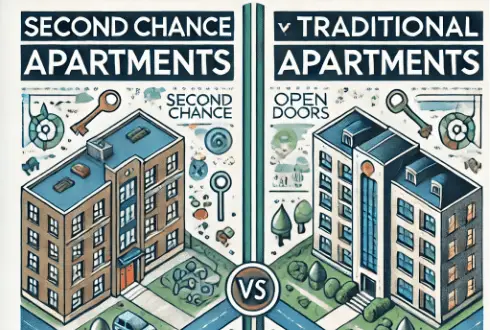
Second chance apartments are made for people who have had trouble renting in the past. Regular apartments, on the other hand, usually have tighter rules.
Key Differences
✨Application Requirements: Traditional apartments often require higher credit scores, clean rental histories, and steady income proof. Second chance apartments, on the other hand, are more lenient, allowing people with evictions, poor credit, or criminal records to apply.
✨Approval Flexibility: Traditional apartments tend to reject applicants with rental or credit issues. Second chance apartments are more flexible, providing renters with an opportunity to explain their circumstances and rebuild their rental history.
✨Security Deposits: It’s common for second chance apartments to require higher security deposits or prepaid rent to mitigate the risks for landlords. Traditional apartments may not always require such upfront costs unless there are specific concerns with the tenant.
Avoiding Future Rental Issues
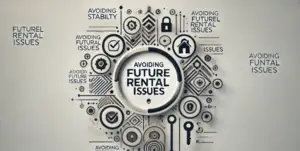
Once you secure a second chance apartment, it’s crucial to maintain a positive rental history to prevent any future issues. Here are effective strategies for avoiding rental pitfalls and building a strong relationship with your landlord.
Positive Rental History maintaining tips
Having a good renting history is important if you want to rent again, especially if you are moving. It is important to pay your rent on time because it shows landlords that you can handle your money.
Steps to Rebuild Credit for Future Housing
Improving your credit score can expand your rental options over time. To do this effectively:
- Ensure timely payment of all bills, including rent, by their due dates. Late payments can negatively impact your credit score, whereas consistent payments can improve it over time.
- Reduce Outstanding Debt: Work toward paying off any outstanding debts, starting with high-interest accounts. Lowering your debt balance helps boost your credit utilization ratio, a key factor in your credit score..
Tenant Rights
Understanding tenant rights is crucial for navigating rentals, especially in second chance apartments. Learn about policies like Late Rent Policies, Repairs & Maintenance, and Eviction Rights to protect yourself as a renter.
Late Rent Policies
Late rent policies outline grace periods, penalties, and notices. Knowing these rules can help you manage payments and avoid issues. Read more about Late Rent Policies to stay informed.
Repairs & Maintenance
Landlords are responsible for maintaining safe, livable conditions. Tenants have rights to request timely repairs. Learn about your rights and responsibilities regarding Repairs & Maintenance.
Security Deposit Rules
Security deposit rules protect both tenants and landlords. Know your rights for deductions, refunds, and timelines. Check out details about Security Deposit Rules to ensure compliance.
Fair Housing Protections
Fair housing laws prevent discrimination based on race, gender, disability, and more. Understanding Fair Housing Protections helps ensure equal rental opportunities.
Eviction Rights
Eviction rights protect tenants from unfair practices. Learn about Eviction Rights in here.
State Rental Laws
Rental laws vary by state, covering leases, deposits, and evictions. Stay informed about State Rental Laws to understand your rights and obligations in your location.
Choose the Right Neighborhood for Your Second Chance Apartment
The neighborhood you choose can have a significant impact on your daily life. Here’s how to ensure you’ve selected a location that suits your needs:
✨Consider Proximity to Work and Essential Services: If possible, choose a neighborhood close to work, public transportation, or essential services, which can make daily errands more convenient and reduce transportation costs.
✨Assess Safety and Community Resources: Look into community resources, such as recreational centers, parks, or libraries. Living in a safe and resourceful community can make your new apartment feel more like home and offer access to local support.
Websites like NeighborhoodScout can help you explore neighborhood data, including safety ratings and proximity to amenities.You can also read our Neighborhood Guide
Establishing a Routine in Your New Second Chance Apartment

Keeping your second chance apartment safe and comfortable can be easier if you set up a regular, organized routine. Having a normal schedule can also help your mental health and make you a more responsible renter.
Preparing for Move-In Day
Move-in day is a great opportunity to set up your new apartment efficiently and create a comfortable space from the start.
- Create a Move-In Checklist: Include tasks such as setting up utilities, checking the condition of appliances, and familiarizing yourself with the property layout.
- Inspect for Any Immediate Repairs: Upon moving in, inspect the apartment for any issues that need attention. Report any necessary repairs to your landlord to ensure a safe and well-maintained living environment.
For a detailed move-in checklist, visit moving planner, which provides comprehensive tips for move-in preparation.
Making Your Apartment Feel Like Home
Once you’ve settled in, personalizing your space can make your second chance apartment feel more comfortable and inviting.
✨Decorate with Personal Touches: Add items like photos, plants, and cozy furniture to make your apartment reflect your style. A comfortable, welcoming environment can improve your sense of well-being and create a positive association with your new space.
✨Set Up a Functional Routine Space: Designate spaces for activities like work, relaxation, and dining. Having specific areas for daily activities can support a structured routine and make day-to-day life more organized.
If you need inspiration for decorating on a budget, Apartment Therapy offers creative ideas and budget-friendly tips for making any apartment feel like home.
Alternatives to Second Chance Apartments
Rent-to-Own Programs

For more information on rent-to-own options, check out Zillow’s Rent-to-Own Guide, which explains the process and benefits.
Subletting as an Option
Subletting involves renting an second chance apartment from a current tenant rather than directly from a landlord. This can be an excellent option for those facing challenges with credit or rental history.


Renting from Private Landlords
Renting directly from private landlords can provide more flexibility than working with larger property management companies. Many private landlords may be more willing to consider applicants with past rental issues.Websites like Facebook Marketplace and Nextdoor often feature private rental listings, allowing you to connect directly with property owners.
Finding Safe Neighborhoods for Your Family

Identifying safe neighborhoods is critical for families looking for second chance apartments. Here are some strategies to ensure safety:



The Future of Second Chance Housing in a Changing Rental Market
The rental market is constantly changing, and so too will second chance housing meet new challenges and opportunities. Here’s what to consider:


This could put pressure on some landlords to be more open to the stiff rental applicants, giving more people who want a rental longer-term.
Resources for Second Chance Apartment Renters
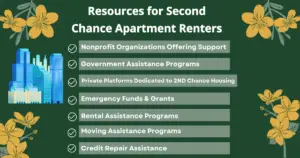
There are numerous resources available to support second chance aparment renters, from nonprofit organizations to government programs. These resources can provide financial assistance, legal support, and tools to help navigate rental challenges.
Nonprofit Organizations Offering Support
Many nonprofit organizations offer direct support to individuals and families seeking second chance apartments, providing essential financial aid and housing services.



Government Assistance Programs
Government programs can offer vital support, especially for individuals and families in need of affordable housing options.



Conclusion
Finding second chance apartments can be a challenging journey, especially for individuals facing financial difficulties, past evictions, or other rental history issues. However, with the right knowledge and resources, securing a stable living situation is achievable.

